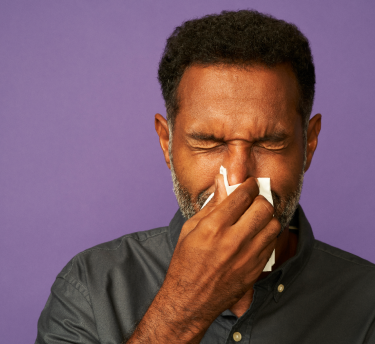Can’t figure out whether you have allergies or a cold? To get the relief you need, you'll need to figure out which one you have first.

What Are Allergies?
Can’t figure out whether you have allergies or a cold? To get the relief you need, you'll need to figure out which one you have first.
Colds are infections of the upper respiratory tract (sinuses, nose and throat).1 Colds are caused by several different viruses and are spread through the air or via close personal contact with someone else who has a cold.2 Seasonal allergies (hay fever) are caused by the immune system reacting to pollen from trees, grasses, and weeds as if it were harmful to the body.3 Symptoms of allergies can include sneezing, runny nose, congestion, itchy eyes and throat, and post-nasal drip.
What are allergies?
Allergies are caused by an overreaction of the immune system to a particular substance, known as an allergen. 5
What is allergic rhinitis?
Allergic rhinitis is a condition in which allergies have caused inflammation of the lining of the nose. Hayfever is also known as seasonal allergic rhinitis. Although the symptoms resemble those of the common cold, they are not caused by an infection. Allergic rhinitis may be seasonal (certain times of the year) or perennial (all year round).1
What is seasonal allergic rhinitis?
Seasonal allergic rhinitis, or hayfever, is caused by an allergy to pollens from grasses, flowers, weeds or trees. It can cause sudden, frequent attacks of sneezing, nasal discharge and congestion. These episodes may also be accompanied by eye symptoms, such as itchy and watering eyes.1
While it typically develops in childhood, it is not unusual to develop hayfever as an adult. In fact, the median age to develop seasonal allergic rhinitis is 15 years.2
What is perennial (year-round) allergic rhinitis?
Perennial allergic rhinitis is an allergy that persists all year round, such as a reaction to allergens such as house dust, animal dander or fungal spores.
What are the symptoms of an allergy?
Cold-like symptoms (sneezing and a runny nose)
Sneezing and a runny nose can often be the first sign of both a common cold and an allergy attack. Unlike the common cold, allergies are not caused by an infection. A mild cold may only last for a few days, but sometimes symptoms can last for up to three weeks.7 If symptoms persist for longer than this time period, you may need to see your doctor.
What are the symptoms of hayfever?
Hayfever symptoms are due to airborne pollens and allergens making their way into your respiratory system, nose or eyes and triggering a reaction that can inflame the area and cause hayfever symptoms.
There are several symptoms that might indicate you are suffering from a hayfever allergy. These include:
What is pollen?
Pollen is a very fine powder produced by the male fertilising agent of flowering plants, which is used to fertilise other plants from the same species. These types of plants can cause pollen allergies (also known as hayfever) in people.3
How is a pollen allergy diagnosed?
A healthcare professional will take a thorough medical history, physical exam and review your symptoms to diagnose your condition. There are skin allergy tests that can be taken to diagnose which allergen is causing your symptoms.4
How can I manage spring pollen allergies?
To reduce pollen exposure and the symptoms of hayfever 1:
How do I treat hayfever?
Telfast® is a non-drowsy antihistamine that works to help reduce the symptoms of hayfever allergies.
If your symptoms are not being relieved by your current treatment, talk to your doctor or pharmacist for other options that may better suit your needs.
Always read the label. Follow the directions for use. If symptoms persist, talk to your health professional.
How do I treat hayfever when pregnant?
Consult your GP or pharmacist about appropriate hayfever medication for your individual circumstances. Telfast should not be taken while pregnant unless specified by a GP or pharmacist.
Do children get allergies?
Hayfever is a common condition that often develops in childhood. Sensitisation to indoor allergens (e.g. dust mites) can occur by the age of two, while sensitisation to outdoor allergens (e.g. grass pollen) can occur by the ages of three to five.2
Do lifestyle factors affect allergies?
A healthy lifestyle can help you manage your allergy symptoms. So, while avoiding allergy triggers is important for managing symptoms, lifestyle choices may also play a part.6
Always read the label. Follow the directions for use. If symptoms persist, talk to your health professional.
MAT-AU-2501287 -1.0 -Jun25
Related articles